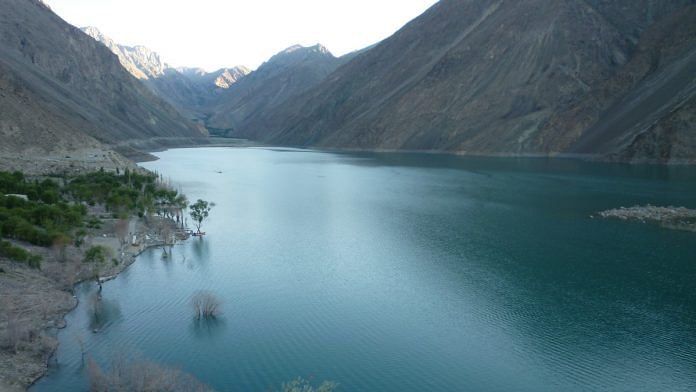New Delhi: The Covid-19 pandemic has cast a shadow on a tradition India and Pakistan have religiously followed, even through the phases of deepest tensions, over the past 60 years.
The bilateral Indus Waters Treaty (IWT), which aims to streamline the sharing of trans-boundary water resources, mandates that the Indian and Pakistani representatives meet once every financial year.
While the Indus water commissioners of the two countries have fulfilled this obligation every year since the treaty was signed in 1960, their meeting this year — which has to be held before 31 March — appears doubtful amid the restrictions imposed to check the Covid-19 pandemic.
On 13 March, India’s Indus commissioner P.K. Saxena wrote to his Pakistani counterpart Sayed Mohammed Meher Ali Shah to request the meeting be postponed to mid-April because of the disruption caused by Covid-19 but the latter has yet to reply.
Saxena told ThePrint that, under the IWT’s provisions, the meeting could be deferred if both sides agreed. “Article 8(10) of the IWT says both the commissioners can decide to defer the meeting,” he said. “But we have not heard anything from the Pakistan commissioner yet.”
The last meeting of the Permanent Indus Commission was held in Lahore, Pakistan, between 29 and 30 August 2018.
This year’s meeting was scheduled for the last week of March in India after Saxena suggested as much in a letter to Shah this February. “On 12 March, the Pakistan commissioner responded, agreeing to come to India in the last week of March.”
But by then, there was a spurt in Covid-19 cases and the World Health Organization (WHO) had characterised it as a pandemic. It was around the same time that India started imposing travel and other restrictions, forcing Saxena to again write to Shah with a suggestion that the meeting be deferred.
In the days since, India has come under a complete lockdown aimed at checking the spread of the pandemic, which has claimed over 10 lives in India.
Sources in the Pakistani administration told ThePrint that Islamabad will participate in the meeting but a date is not known yet as the country is itself grappling with the pandemic.
“It is Pakistan that has always asked for a meeting from India. So, there is no question of not meeting on such an important issue,” a source said. “But in the wake of the coronavirus pandemic, it may happen at a much later date,” the source added, claiming Islamabad will soon communicate a date to New Delhi.
Also Read: Modi govt steps up work on projects that will tap Pakistani waters, J&K’s UT status helps
IWT under strain since 2016 Uri attack
If this year’s meeting happens, it would be the commission’s 116th. “The two commissioners have met at least once every year since the IWT was signed in 1960,” Saxena said. “In the past, when some dispute arose, the two commissioners met more than once a year.”
Brokered by the World Bank in 1960, the IWT outlines how India and Pakistan should utilise the water of the six rivers of the shared Indus river system. While the western rivers of the system — Indus, Jhelum and Chenab — fall in Pakistan’s share, the three eastern ones — Ravi, Beas and Sutlej — are to be used by India.
Although the meetings have continued, the IWT has been under strain since 18 September 2016, when an attack by Pakistani terrorists killed 19 soldiers at the Uri Army camp.
“Blood and water cannot flow together,” Modi said at a meeting held to review the treaty soon after the attack, where he directed officials to fast-track infrastructure projects on the Indus river basin, some of which have been opposed by Pakistan.
Modi had said at the time that India was going to exercise its right to make full use of its share of water for meeting its power and agricultural requirements. India has so far let unused water from its share flow to Pakistan. The meeting of the commission was also briefly suspended after the Uri attack, but it was eventually held before the financial year ended.
The 14 February 2019 Pulwama attack once again triggered speculation that India could call off the treaty. Indian officials, however, have maintained that there is no such proposal on the table.
With inputs from Nayanima Basu
Also Read: India cannot satisfy Pakistan enough without reworking the Indus Water Treaty




I know that the so-called journalists at The Print will intensely dislike this suggestion because of their anti-national inclinations, but let’s suspend the IWT talks indefinitely and scrap it altogether as soon as we are economically and militarily strong enough.
The meeting could take place by video conference.
Why not agree to all the demands by Pakistan so that there is no need to meet again and irritants like terror attacks, natural or man made calamities like Corona virus epidemic cause no troubles!!!